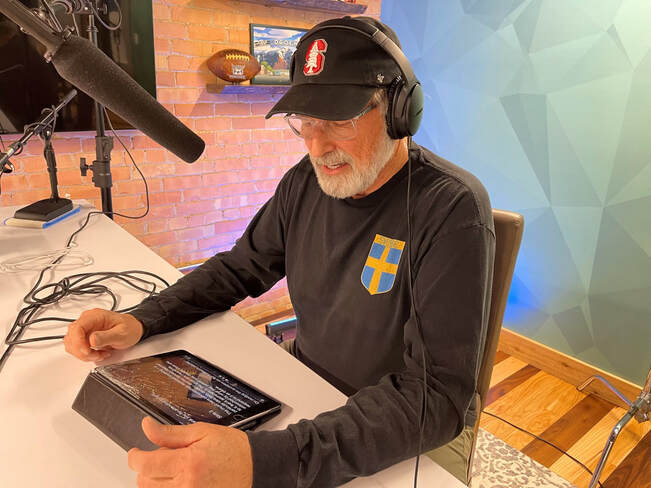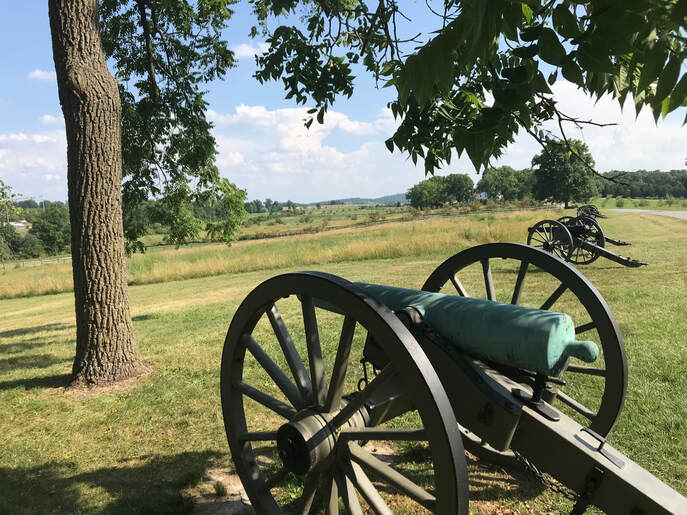|
Written by my brother Bob regarding Memorial Day and our family history. We have both delivered this talk at Sacrament Meeting on Memorial Day weekend. When I was growing up there was no doubt in my mind that America was an exceptional country. We were taught in school, in the home, and in the community that this was a country founded on an idea. The idea that God granted us rights that no man could take away, that individuals were free to choose the path of their life for themselves. The only country in the world that was founded that way. A person could come to this country from anywhere and become an American. We were taught history in school, and it was OK to talk about the founders of this country praying, or to talk about them repeatedly saying the hand of divine providence was guiding them. We didn't pretend that divine providence meant something other than help and guidance from God. As members of the Church of Jesus Christ of Latter-Day Saints, we are taught, and the scriptures tell us, that this is the Promised Land and this mysterious higher power is called God. This is an exceptional country with an exceptional constitution; in fact the oldest constitution on the earth. The Lord himself tells us in Doctrine and Covenants: 101:80, “I established the Constitution of this land by the hands of wise men whom I raised up unto this very purpose” and says in D&C 98:5, that the constitution “belongs to all mankind”, and then he tells us in D&C 101:77 that it “should be maintained for the rights and protection of all flesh, according to just and holy principles.” Alexander Hamilton, famous as the originator of The Federalist papers and author of fifty-one of the essays, said: “For my own part, I sincerely esteem it a system, which without the finger of God, never could have been suggested and agreed upon by such a diversity of interest.” Charles Pinckney, a very active participant and author of the Pinckney Plan during the Convention, said: “When the great work was done and published, I was struck with amazement. Nothing less than the superintending Hand of Providence, that so miraculously carried us through the war … could have brought it about so complete, upon the whole.”
During his first inaugural address in 1789, President George Washington, one of the men the Lord says he raised up, said: “No people can be bound to acknowledge and adore the invisible hand, which conducts the affairs of men, more than the people of the United States. Every step by which they have advanced to the character of an independent nation seems to have been distinguished by some token of providential agency.” President Ezra Taft Bensen said, "Our Father in Heaven planned the coming forth of the Founding Fathers and their form of government as the necessary great prologue leading to the restoration of the gospel. Recall what our Savior Jesus Christ said nearly two thousand years ago when He visited this promised land: from (3 Ne. 21:4) ‘For it is wisdom in the Father that they should be established in this land, and be set up as a free people by the power of the Father, that these things might come forth.’ America, the land of liberty, was to be the Lord’s latter-day base of operations for His restored church." So here we are today, in this special, exceptional place, with God's restored gospel in the Dispensation of the Fullness of Times. As the restoration of the gospel unfolded many amazing events unfolded as well, one such event occurred on April 3rd, 1836. Joseph Smith and Oliver Cowdery, arose from what Joseph termed, "silent and solemn prayer." Upon arising Joseph says the following vision was opened to both of them: I quote from D&C 110:13-15:13. 13 Elijah the prophet, who was taken to heaven without tasting death, stood before us, and said: 14 Behold, the time has fully come, which was spoken of by the mouth of Malachi—testifying that he [Elijah] should be sent, before the great and dreadful day of the Lord come-- 15 To turn the hearts of the fathers to the children, and the children to the fathers, lest the whole earth be smitten with a curse-- The sealing powers were restored to the earth, and the spirit of Elijah has been with us ever since. Elder Richard G. Scott tells us the spirit of Elijah is a manifestation of the Holy Ghost, and the Holy Ghost can touch all those who have room in their hearts for him to enter. I would like to tell you a story that I believe relates to both Memorial Day and the Spirit of Elijah. John W. Jones was born on June 21, 1817, on a plantation in Leesburg, Virginia as a slave to the Ellzey family. As a youngster, Jones was the houseboy of William Ellzey’s elderly daughter, Sally. Sally was very fond of the child and took the time and trouble to teach him to read and write. As the years went by Sally got older and John W. became concerned that when Sally passed away he would be sold to another family and probably would find himself in much poorer conditions than he was accustomed to. So, in June 1844, John, two half-brothers, and several other slaves snuck away and headed north. While fleeing north they were able to elude slave hunters in Maryland and made their way to the Free State of Pennsylvania. The five men continued north until they reached New York and finally arrived in the small town of Elmira, on July 5, 1844. Jones became active in the First Baptist Church and in 1847 purchased a house next to the church and became sexton for the Baptist Church Second Street Cemetery. He also became very active in the Underground Railroad that helped many runaway slaves escape to Canada. South and west of Leesburg, in Logan County, Virginia, lived Captain Joseph McDonald, his wife and eleven children. Joseph was a veteran of the War of 1812 and a successful farmer. As war broke out in 1861, all five of Joseph's sons enlisted in the service of the State of Virginia. Three of them joined what would become the 16th Virginia Cavalry. They were Pvt. John C. McDonald, born in 1820, Pvt. Floyd McDonald, born in 1829, and their brother Captain Lewis McDonald, born in 1823. The 16th Virginia Cavalry came under the command of Confederate General J.E.B. Stuart, in General Robert E. Lee's Army. At that time in history the cavalry was considered to be a very important part of an army. In fact, the cavalry was commonly referred to as the 'eyes and ears' of the army. In the early summer of 1863, Gen. Lee's Army had crossed the Potomac and was headed north. Gen. J.E.B. Stuart's cavalry had separated from Lee's Army to disrupt Union supply lines and to try and locate the main body of the Union Army. While executing this plan Gen. Stuart likely became a victim of his own success. He captured a large Union supply train of wagons and horses and some 400 Union prisoners, all of which helped delay his return to the main army. Because of this delay, the Confederate Cavalry was not present when Gen. Lee's Confederate's collided with Gen. Meade's Federals, at Gettysburg. Stuart did show up during the battle but many attribute the Confederate loss at Gettysburg to Lee not knowing where the Federal units were deployed during the first stages of the battle. As the battle of Gettysburg ended, Lee assigned the Cavalry, including the 16th Virginia, to cover the Army's flanks as it withdrew, and the three McDonald brothers spent the next weeks defending Lee's retreat. Four months after the Gettysburg battle, President Abraham Lincoln traveled to Gettysburg and delivered his now famous address. In the address he dedicates a portion of the battlefield as the final resting place of those who struggled and died there. At Gettysburg, as well as most other Civil War battles, the dead were buried on the battlefield. Friends and families would go to the battlefield following the conflict and find their fallen loved ones. And there they would do the best they could to create a final resting place for them. Since most of the beginning battles of the War were fought in the South; mothers, sisters and children of the Southern dead began returning to and decorating the graves of their loved ones with flowers. They began doing this in May, when flowers became plentiful after the cold winter, and it began to be called Decoration Day. Eventually the practice caught on in the North, and both sides decorated graves throughout the remainder of the war. In 1868, May 30th was designated Memorial Day, and flowers were placed on the graves of the war dead, for both the North and the South, at Arlington Cemetery. Months after the battle of Gettysburg, Gen. Lee heard that Gen. Ulysses Grant had withdrawn most of his federal forces from Washington D.C. Grant apparently did not believe that Lee had the strength or resources to fight all the way to the Capital and take it; and he needed the forces elsewhere. Lee sent General Jubal Early and a force of 15,000 Confederate infantry and cavalry, including the 16th Virginia, across the Potomac River toward Washington. Gen. Early's forces made it to within several miles of the Capital before they were discovered. Union General Lew Wallace hastily assembled 6500 Federal troops and caught up with the Confederates at the Monocacy River near Frederick, Maryland in July of 1864. This battle is often referred to as the 'Battle that saved Washington D.C.' General Wallace's hope was to stop or at least delay the Confederate advance into Washington. I would like to go back to Elmira, New York. Both sides in the Civil War struggled with what to do with prisoners. Most POW camps were set up hastily and almost always ended up with two or three times as many prisoners as the camp was designed for. This was the case when it was decided that a new POW camp would be set up near Elmira, New York. As the camp was being built, the Federals recruited John W. Jones, the former slave, as the sexton for the cemetery that was to be established at the camp. Back at Frederick, Maryland the 16th Virginia Cavalry ran into Union troops at the Monocacy River, they dismounted and engaged the Federals. The struggle lasted all day and into the next. John C. was wounded, his position was overrun and he was captured, while his brothers, Floyd and Lewis, along with a small number of men from the 16th, escaped and got separated from the main force. Although they did not win the battle, the Federals were able to delay the Confederate advance long enough to allow Gen. Grant to reinforce the Capital. When Gen. Early heard that reinforcements had arrived, he took his Confederates back across the Potomac and from that time forward the Rebels never fought another major battle in northern territory. Wounded and captured, John C., was sent to a Union POW Camp at Point Lookout, Maryland. The day after the wounding and capture of John C., his brother Floyd was wounded in a skirmish nearby, and he was also captured. The third brother, Captain Lewis, made his way back to his unit and returned across the Potomac with Gen. Early's forces. Back in New York- Elmira was a failure as a POW camp almost from the beginning. The severely overcrowded camp had a central pond that ended up being used as a water source and for waste disposal at the same time. Disease and illness took many lives, and the cold took many more. During its brief one-year life span, Elmira housed roughly 12,000 Confederate prisoners, of which nearly 3,000 perished. John W. Jones, the former slave, had his hands full trying to manage the cemetery at Elmira. Every morning he would bring a wagon through the camp and pick up the dead. There were days when he would oversee the pick-up and burial of as many as 40 Confederate bodies. He could have dumped the bodies in mass graves like occurred at many other camps. But John W. was different. He was a good Christian man, and I contend he listened to the Spirit. Instead, John W. asked questions about every man he picked up. He recorded the information in a book and then rewrote the information on a slip of paper and placed the paper in a small bottle. This bottle was then placed in the pit of the arm of the deceased and the bodies were then interred in measured rows with markings. John W. did such an amazing job at Elmira that when the war was over, it was found, that out of the nearly 3000 men he buried, only seven were unidentified. Shortly after the Battle of Monocacy, John C. was placed on a ship and moved from Point Lookout to Baltimore and then by rail to the Elmira POW Camp. Floyd was also shipped by rail and arrived at Elmira shortly after his brother. Both men fell ill, either from the conditions or their wounds, and perished in early 1865, just before war's end. Years later, when their brother, Captain Lewis McDonald, was interviewed about the war, he stated he had no idea what had happened to his brothers. He had tried to find them after the war and had heard that John C. may have died on a ship and was likely buried at sea, but had heard nothing about Floyd. He said he did not even have a place to put flowers on Decoration Day. As it turned out, although Captain Lewis McDonald did not know what had happened to his brothers, through the efforts of John W. Jones, there really was a place to put flowers on Decoration Day. At the end of the war the amazing efforts of this ex-slave, were recognized and the cemetery at Elmira, New York, was renamed Woodlawn Cemetery and it became the first National Cemetery of the United States of America. In that National Cemetery lie the remains of John C. and Floyd McDonald and because of the humanity and inspiration of John W. Jones, there are two clearly marked headstones listing their names, their death dates, and which show them as fallen members of the 16th Virginia Cavalry. Because John W. Jones listened to the Spirit, my older brother had the great honor and privilege of performing the ordinance work for these two of our family ancestors; both of which perished without descendants. When I first learned of John W. Jones and what he did in establishing Woodlawn National Cemetery, my first thought was that he had to have been influenced by the Spirit. It occurred to my brother and I that we should check and make sure that someone had done the ordinance work for him that had enabled us to do for our ancestors. Well, we checked and the work for John W. Jones has been done. It was completed in 2005 and simply shows the submitter to be "Family Search". The interesting thing is that Mr. Jones name stands alone in the data base. It shows no parents, wife or children; no relationships. It makes us think that at some point around 2005 the Church of Jesus Christ of Latter Day Saints recognized the significance of Mr. Jones' actions, and his willingness to follow the Spirit, and the First Presidency authorized his work to be done. I pray someday soon a direct descendant of his will also feel the Spirit of Elijah, and complete the work for the remainder of his family. Monday is Memorial Day. A day dedicated to the remembrance of those who gave their all for this Nation. I would take us back to Gettysburg, where President Lincoln delivered his profound and simple eight sentence address. Most everyone remembers the beginning when he says "Four score and seven years ago…” but I would like to take you to the last sentence. It reads, "…It is rather for us to be here dedicated to the great task remaining before us-that from these honored dead we take increased devotion to that cause for which they gave the last full measure of devotion-that we here highly resolve that these dead shall not have died in vain-that this nation, under God, shall have a new birth of freedom-and that government of the people, by the people, for the people shall not perish from the earth." The last thing I would like to touch on today has to do with my profound gratitude to each of you who have faithfully served this Nation. By preserving this land as a land of freedom and agency, you have helped maintain, as President Bensen said, the "Lord’s latter-day base of operations for His restored church." When my nephew, my brother’s only son, was serving in combat in Iraq ten years ago, we said a lot of prayers for him and his compatriots. We also had the opportunity to read and hear some of the prayers that the soldiers and the chaplains said as well. I came across this prayer. I will call it a 'Soldier's Prayer' although it had no title when I found it, and the author is unknown to me, I would like to share it with you: Dear God Should fate find us in battle, may our cause be just. May our leaders have clear vision. May our courage not falter and may we be triumphant. May we earn victory as we show mercy to our enemies. May our efforts bring lasting peace. May our sacrifice be always appreciated by those we serve. May we return to our loved ones unharmed. Should we be harmed, may our wounds heal. Should we perish in the struggle, we pray Thee Father, embrace us, And find for us a place in Thy Kingdom. Amen I testify that the God of heaven sent some of His choicest spirits to lay the foundation of this government, to establish this nation and to restore this church; and He has sent other choice spirits to help preserve and defend it. He has also, all along the way, sent choice spirits to do his work and bring to fruition the last of the promise of Malachi; that the hearts of the children would be turned to the fathers. We need to turn our hearts to the fathers. In Doctrine and Covenants we are repeatedly told, "Behold, the field is white already to harvest; therefore, whoso desireth to reap let him thrust in his sickle with his might, and reap while the day lasts, that he may treasure up for his soul everlasting salvation in the kingdom of God." I don't believe this is just referring to missionary work. I believe it also refers to all of God's work; and God's work and his glory is to bring about the immortality and eternal life of his children; all of God's children, even those without posterity in this life. Do you have a Floyd or a John C. in your family? In many cases these veterans left this life without posterity, or their line has died out, but they are still part of your family and all are God's children whose work needs doing. I bear testimony that the Lord lives and in John 15:13 when he says, "Greater love hath no man than this, that a man lay down his life for his friends." The Lord is not only speaking of laying down his life for us, but of those noble souls who sacrifice themselves for us all. They fell, but over their glorious grave floats free the banner of the cause they died to save. I hope this Memorial Day you will each take a few moments and give thanks for all those who gave their all. I hope you get a lump in your throat and a tear in your eye. God bless America! I say all these things…and pray humbly in the sacred name of our amazing Savior and Redeemer, Jesus Christ, Amen This is background…regarding our family. I am a direct descendant of Stephen, Joseph’s brother. So Joseph’s sons (Floyd, John C., and Lewis) were Stephen’s nephews. Stephen had sons that fought in the Civil War as well, including my great great grandfather Crockett. Crockett was captured at the battle of Springfield and was sent to Gratiot Prison in St. Louis where he signed an oath and was released. He was questioned several times after that because neighbors accused him of giving aid to the Confederates by feeding them and letting them hide in his corn field. Stephen’s family moved from Virginia to Missouri after he was accidently shot and killed while they were hunting a black bear that was terrorizing livestock. Stephen had already purchase several parcels of land in Missouri when he was killed. His family then moved to Chilicothe, Missouri about five years before the war. Crockett had brothers that fought for the South as well but the situation in Missouri was different than other confederate supporting states because at the start of the war a Union force was sent to capture the capital and the southern leaning Governor. The governor escaped and set up a shadow government in the southwest corner of the state. Marshall Law was declared and for the duration of the war the police force was the Union Provost Marshall’s Office. This meant that anyone who openly supported the Confederates was subject to arrest. A point of interest is that Crockett’s youngest brother was named Witten, and I have found no records indicating he fought in any of the Missouri battles. He became a wealthy business man in Kansas City and when he died in 1910 there were a number of articles in the newspaper that talked about his life. One of the articles said he kept a lifelong scrapbook that was donated to the Jackson County Historical Society upon his death. My brothers and I contacted the Historical Society and they still have the scrapbook but it can only be viewed in person. Last October my older brother Bob and my younger brother Mike and I visited Missouri and viewed the scrapbook, the family bible and many articles written about my great great uncle Whitten. We were able to put definition to this part of our family history as described in this talk by discovering the heroic efforts of John W. Jones. It was a wonderful family genealogy expedition that bore great fruit! Happy Memorial Day!
0 Comments
Leave a Reply. |
AuthorBill Olson Archives
April 2024
Categories
All
|



 RSS Feed
RSS Feed
